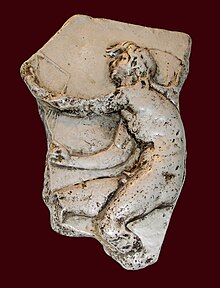Our website is made possible by displaying online advertisements to our visitors.
Please consider supporting us by disabling your ad blocker.
Kairos
This article needs additional citations for verification. (July 2024) |


Kairos (Ancient Greek: καιρός) is an ancient Greek word meaning 'the right or critical moment'.[1] In modern Greek, kairos also means 'weather' or 'time'.
It is one of two words that the ancient Greeks had for 'time'; the other being chronos (χρόνος). Whereas the latter refers to chronological or sequential time,[2] kairos signifies a good or proper time for action. In this sense, while chronos is quantitative, kairos has a qualitative, permanent nature.[3]
The plural, kairoi (καιροί) means 'the times'. Kairos is a term, idea, and practice that has been applied in several fields including classical rhetoric, modern rhetoric, digital media, Christian theology, and science.
- ^ Liddell and Scott, Greek-English Lexicon.
- ^ Liddel, George; Scott, Robert. "A Greek-English Lexicon". www.perseus.tufts.edu. Archived from the original on 30 October 2022. Retrieved 30 October 2022. Definition 2, in particular, references chronological time - dates and years. For example, the reference to Thucydides translates to "but he is somewhat concise and not accurate in his dates." Where "in his dates" is "τοῖς χρόνοις."
- ^ "(Dictionary Entry)". Henry George Liddell, Robert Scott, A Greek-English Lexicon. Retrieved 2015-07-13.
Previous Page Next Page


